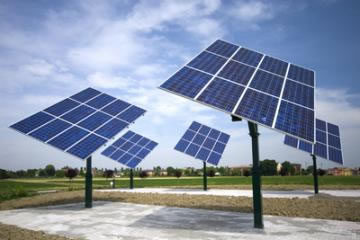First solar of Arizona may be green energy powerhouse, but challenges

 First Solar, based in Tempe AZ, is the world's biggest manufacturer of thin-film photovoltaic solar panels. They use cadmium telluride rather than silicon in creating the panels. This has given them a price advantage over their fast-gaining Chinese competitors, and while such a method is less efficient in creating energy, it can also do so in lower light conditions. Thus, power generation is more stable, which is an advantage for grid-scale installations.
First Solar, based in Tempe AZ, is the world's biggest manufacturer of thin-film photovoltaic solar panels. They use cadmium telluride rather than silicon in creating the panels. This has given them a price advantage over their fast-gaining Chinese competitors, and while such a method is less efficient in creating energy, it can also do so in lower light conditions. Thus, power generation is more stable, which is an advantage for grid-scale installations.
Right now, First Solar is creating panels for about 75 cents a wattvs. $1.10 from China. This gives them a big advantage - for now. But some analysts don't think they can keep this up because of the huge investment that Asian governments are pouring into solar. Our federal government, of course, is putting money into solar too. But the recent Solyndra bankruptcy will almost certainly slow such funding going forward. Current funding expired as of September 30. Even some Democratic lawmakers are leery about voting for more renewable energy loan guarantees. So this is a double hit for renewable energy loan guarantees and financing from the government. Asian countries were already backing their solar plants heavily, more than in the US. And now US funding looks to be slashed, if not decimated.
Right before the funding expired, First Solar got $2.1 billion in partial loan guarantees from the Department of Energy. $1.46 billion will go to construction of the 550 MW Desert Sunlight solar farm in Riverside, California while $646 million will help build the 230 MW Antelope Valley Solar Ranch. Both facilities have in effect been pre-sold, even before construction has started. Desert Sunlight was purchased jointly by GE Energy Financial Services and NextEra Energy Resources (PG&E will get 300 MW while SCE will receive 250 MW of the power.) Exelon bought Antelope Valley.
While financing and arrangements on huge construction projects can certainly be convoluted and complicated, I must confess this all makes me a bit twitchy. The government gives partial backing on $2.1 billion in loans to build two solar plants which, even though construction hasn't started, have both been sold by the builder to other companies, who already have contracts to sell the power. What could possibly go wrong with that? Well, ask all those prospective condo buyers in Miami in 2006 how all that worked out when they put down hefty deposits for condos that hadn't been built. But goodness, you, say, that was just speculation, and in Miami no less. The solar plants will be real and substantive. Yet those condo buyers thought they were buying something real too.
The point is, market conditions can change rapidly, disruptive technologies can make existing industries obsolete (for example, let's say, someone figures out how to build wind power for 30 cents a watt), companies can experience financial problems in other sectors that hurt them in renewables, but most of all, most current renewable energy construction depends in some way on government funding. Much of that funding will probably not be renewed by Congress. This is turn will adversely affect the industry.
China is both a renewable energy powerhouse and has, to us, a bizarre hybrid system. They encourage capitalism yet the nominally communist government often owns a piece of such businesses and may sometimes control them. Maybe the US government could explore such possibilities, such as stock options in return for loan guarantees and other such vehicles so that if the company prospers, the government does too, in addition to being paid back on the loans.


